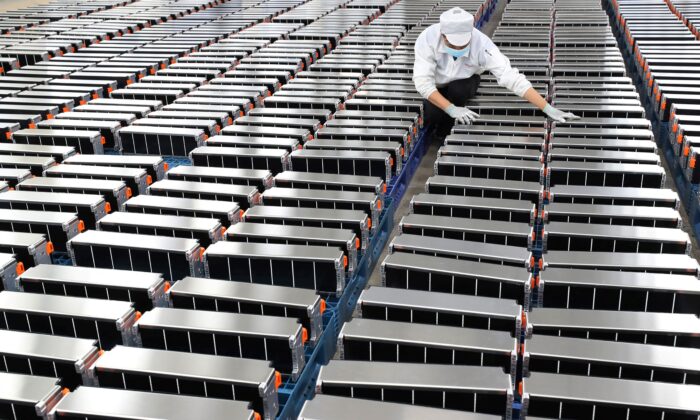
A worker with car batteries at a factory for Xinwangda Electric Vehicle Battery Co. Ltd, which makes lithium batteries for electric cars and other uses, in Nanjing in China’s eastern Jiangsu Province, on March 12, 2021. (STR/AFP via Getty Images)
By
China’s control over the global lithium supply chain presents elevated risks to downstream U.S. companies as Chinese companies continue to expand their footprints in overseas lithium mines.
“We love our suppliers, and we have a very strong relationship, but we are very dependant on the supplies coming from China. … We think there are risks in terms of the stability of the supply, given everything happens geopolitically,” Tim Karimov, president of U.S. lithium battery manufacturer OneCharge, said in a presentation at the MODEX 22 seminar.
MODEX is the largest manufacturing and supply chain expo held in North America and South America. MODEX 22 was held on March 28-31 at Atlanta’s Georgia World Congress Center.
In January, OneCharge released a white paper addressing the U.S. role in global lithium battery manufacturing and the risks China poses to the supply chain.
“China currently dominates the global lithium battery supply chain. Upwards of 70% of the total global Li-ion battery manufacturing capacity is controlled by China. … Should China decide to throttle supply or dramatically raise prices, this would hurt the U.S. transportation and logistics sectors, which are quickly adopting lithium battery-powered electric vehicles,” the report states.
According to the Chinese digital newspaper The Paper, BYD Co. Ltd. (01211.HK), a Chinese conglomerate and electric vehicle manufacturer, is currently in talks to buy six lithium mines in Africa containing more than 27 million tons of lithium oxide at 2.5 percent grade—enough to supply BYD with 10 years of lithium oxide.
EV manufacturers have come under pressure due to the soaring lithium price for EV batteries amid the surging demand for electric vehicles. As a result, many companies also have stepped into the global race to acquire lithium mines.
China’s lithium sources primarily come from ecologically fragile areas, such as the Qinghai-Tibet Plateau, with a harsh natural environment, poor infrastructure, and significant technical challenges. Despite those challenges, Beijing has actively encouraged Chinese state-backed companies to secure lithium mines overseas to surpass Europe and the United States in the new energy industry, according to Chinese state-run media Yicai.
Chinese Control in Critical Lithium Resources
The lithium industry has a high degree of market concentration. In 2020, five companies accounted for nearly half of the world’s lithium production capacity, producing approximately 75 percent of the worldwide supply, according to a report released by China Merchants Bank Research Institute on March 4.
Two of the five companies—Jiangxi Ganfeng Lithium Co. Ltd. (01772.HK) and Tianqi Lithium Co. Ltd. (02466.SZ)—are from China. Both companies have taken up significant shares in global lithium resources, allowing them to control the lithium supply chain.
Chinese battery giant Ganfeng Lithium’s overseas footprint in lithium resources spans Australia, Argentina, and Ireland, according to its 2021 annual report.
Among them, the Mount Marion Project in Australia is the largest source of Ganfeng’s lithium supply. Ganfeng secures stable raw materials supplies by signing long-term procurement agreements with upstream lithium providers after investing in them.
Chinese giant Tianqi Lithium has also secured its lithium supplies by purchasing massive shares of leading companies in the upstream lithium supply chain. In 2014, Tianqi Lithium acquired 51 percent shares in Windfield Holdings, the shareholder of Talison Lithium, which owns the Greenbushes lithium deposit in Western Australia—the world’s largest hard-rock lithium mine.
And in 2018, Tianqi Lithium purchased 23.77 percent shares in SQM, a world-leading brine-based lithium producer. The company has since become the second-largest shareholder of SQM.